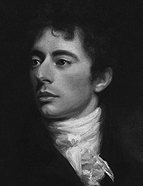

Southey returned to Portugal with the aim of establishing himself as a man of letters. His revolutionary fervour was dampened by the series of events in France. William Speck explains how Southey's political positions fluctuated during the course of the Revolution, highlighting his repudiation of the widespread violence while also expressing a positive regard for the personalities of the Jacobin Robespierre (1758-94) and the Girondin Brissot (1754-93), whose deaths he mourned (W. Speck, Robert Southey... , 2006, pp. 37, 46, 64). Amidst the disorientation caused by the Revolution, his scepticism about the present grew. While the past could serve as a refuge for the poet's imagination to some extent, its idealisation was equally barred due to the barbarities from the past (Idem, p. 73). Faced with this complex sensitivity to temporality and the oscillation of political adjustments, combined with the rise of Napoleon, it delivered the fatal blow that distanced Southey from revolutionary ideals (Idem, p. 81).
Simultaneously with his study of canonical Lusitanian historiographical and literary works and his dialogue with Portuguese scholars, Southey assessed his endeavour to write the História de Portugal given the achievements of Edward Gibbon, David Hume, William Robertson, William Roscoe, and Samuel Johnson, as his intention was to compose the work in English. In this way, the scholar aimed both to make a profit and achieve critical success through the sales of the work in Great Britain (R. Southey, Journals of a Residence in Portugal 1800-1801... , 1960 [1801], pp. 149, 166).
Southey believed that Johnson's descriptive and refined language was insufficient to convey the grandeur of the Portuguese military achievements in the Middle Ages. A similar critique was applied to the works of Gibbon and Hume, as Southey perceived these scholars to be excessively bound by classical decorum, which he believed impeded the expression of individuality. In contrast, Southey considered the literary expressions of figures such as Francis Bacon (1561-1626), John Milton (1608-1674), and Jeremy Taylor (1613-1667) to be analogous in their rusticity, simplicity, and clarity to the style employed by Portuguese chroniclers. Southey regarded these literati as classically superior to both the old and contemporary, as they had not been tainted by the "metaphysical taste" that dominated the 17th century. His works embodied the rusticity characteristic of 14th, 15th, and 16th-century writings.
This work is financed by national funds through FCT - Foundation for Science and Technology, I.P, in the scope of the projects UIDB/04311/2020 and UIDP/04311/2020.
